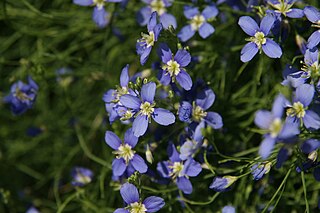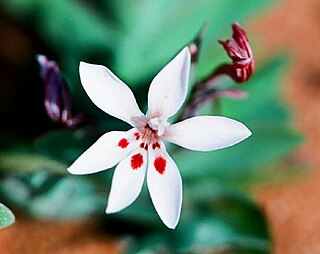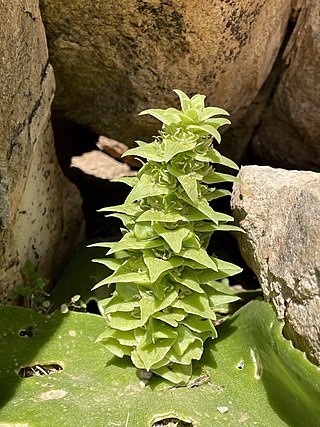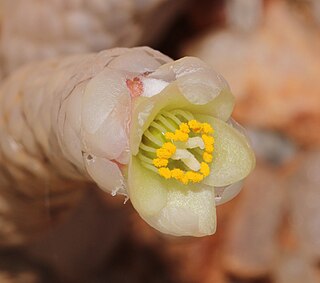
Agapanthus africanus, or the African lily, is a flowering plant from the genus Agapanthus found only on rocky sandstone slopes of the winter rainfall fynbos from the Cape Peninsula to Swellendam. It is also known as the lily-of-the-Nile in spite of only occurring in South Africa.

Satyrium coriifolium is a species of orchid endemic to the Cape Provinces. It is commonly known as the orange satyre or Ewwa-trewwa in Afrikaans.

Lapeirousia is a genus in the plant family Iridaceae. It is endemic to sub-Saharan Africa, about a third of the species occurring in fynbos.

Geissorhiza radians or winecup flower is a highly threatened species from the Iris family with fewer than 10 remaining sub-populations growing in south-western Cape, South Africa. The deep purple flowers with large, red centres grow is dense colonies which makes for a spectacular flower displays from mid-September, particularly around the town of Darling. Its seasonally wet lowlands habitat is however becoming increasingly threatened with more than 80 % of its original habitat now permanently transformed into agriculture or urban sprawl and the remaining populations threatened by encroaching invasive alien vegetation and fertilizer runoff. The dark-centred flowers aim to attract specific pollinators from the horsefly family (Tabanidae), but the specific interactions still require additional investigation.

Cyanella lutea is a species of cormous herb, native to South Africa and southern Namibia, where it grows in clay-rich or loamy soils.

Protea aurea subsp. potbergensis, also known as the Potberg protea, or Potberg sugarbush, is a flowering plant of the genus Protea. It is endemic to South Africa and is found only in the Potberg near Cape Infanta. It grows to a height of 5 metres, and flowers primarily from May to June.

Leucadendron elimense, the Elim conebush, is a flower-bearing shrub, which belongs to the genus Leucadendron and forms part of the fynbos. The plant is native to the Western Cape, South Africa.
Diastella thymelaeoides subsp. thymelaeoides, the Kogelberg silkypuff, is a subspecies of Diastella thymelaeoides that belongs to the genus Diastella and forms part of the fynbos. The plant is native to the Western Cape and occurs in the Hottentots Holland Mountains and northern Kogelberg around the Steenbras Dam. The shrub grows erect and grows only 1.5 m tall and flowers throughout the year with a peak from August to November.

Ixia scillaris is a perennial cormous flowering plant in the genus Ixia. It is endemic to a small portion of the Fynbos in the Western Cape.

Willdenowia incurvata is a species of flowering plant in the genus Willdenowia endemic to the Fynbos region of the Northern Cape and Western Cape. It is also known as the sonqua sunreed; or sonkwasriet in Afrikaans.

Wachendorfia multiflora is a species of herbaceous plant in the genus Wachendorfia. It is endemic to the Western Cape. It also known as the Kleinrooikanol in Afrikaans.

Heliophila coronopifolia is a species of flowering plant in the genus Heliophila. It is native to the Northern Cape and Western Cape provinces of South Africa.

Lapeirousia jacquinii is a species of flowering plant in the genus Lapeirousia. It is endemic to the Northern Cape and Western Cape of South Africa.

Lapeirousia arenicola is a species of flowering plant in the genus Lapeirousia. It is endemic to the Northern Cape and Western Cape of South Africa.

Limeum africanum is a species of flowering plant in the genus Limeum. It is endemic to Southern Africa. It is also known by the names common lizardfoot and koggelmandervoet; Afrikaans for the foot of a lizard from the genus Agama.

Massonia bifolia is a species of geophyte in the genus Massonia. It is native to southern Namibia and to the western Cape Provinces of South Africa.

Anacampseros papyracea is a species of succulent plant in the family Anacampserotaceae. It is endemic to Southern Africa.
Athanasia pectinata is a species of plant from the Western Cape of South Africa.

Athanasia quinquedentata, or the fivetooth kanniedood, is a species of plant from South Africa.

Lapeirousia anceps, also known as long kabong, is a species of geophyte in the genus Lapeirousia. It is native in the Cape provinces in South Africa.























